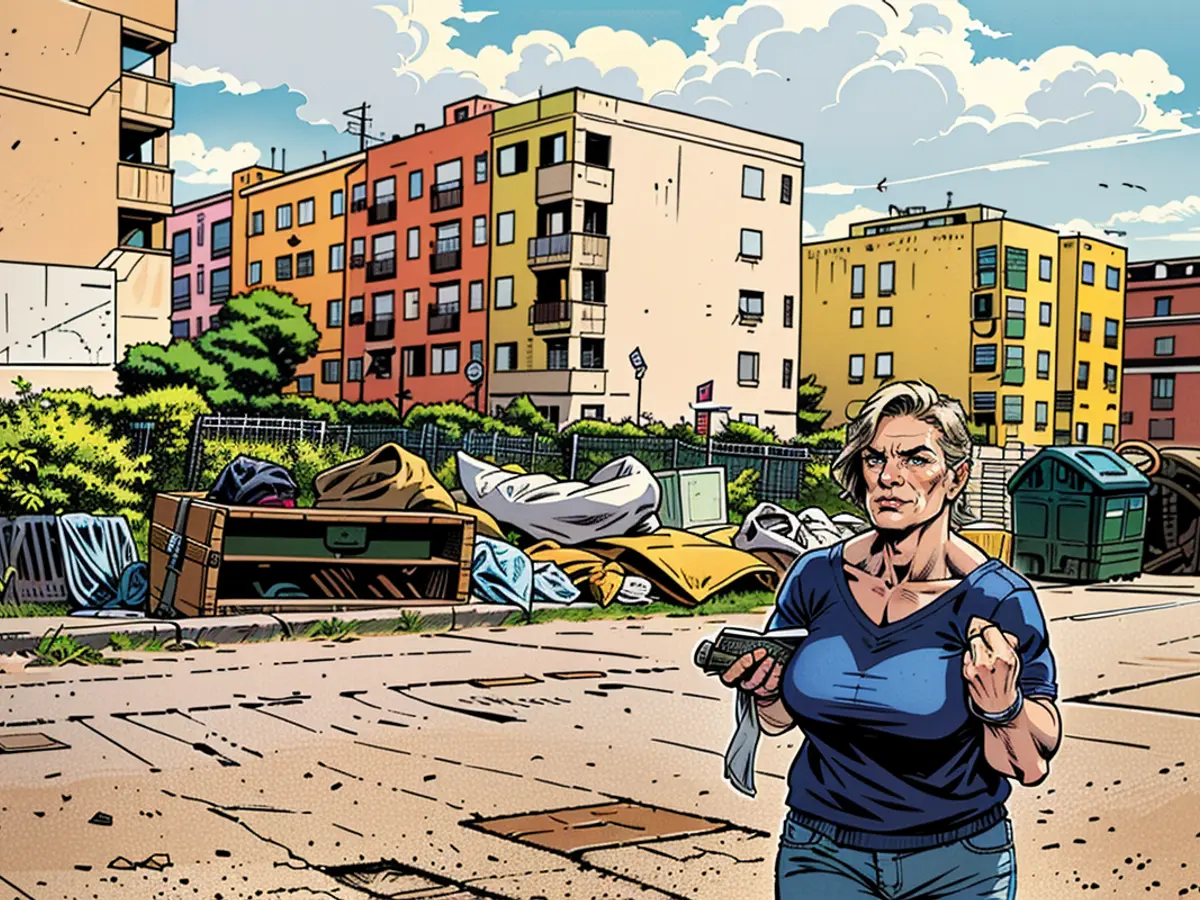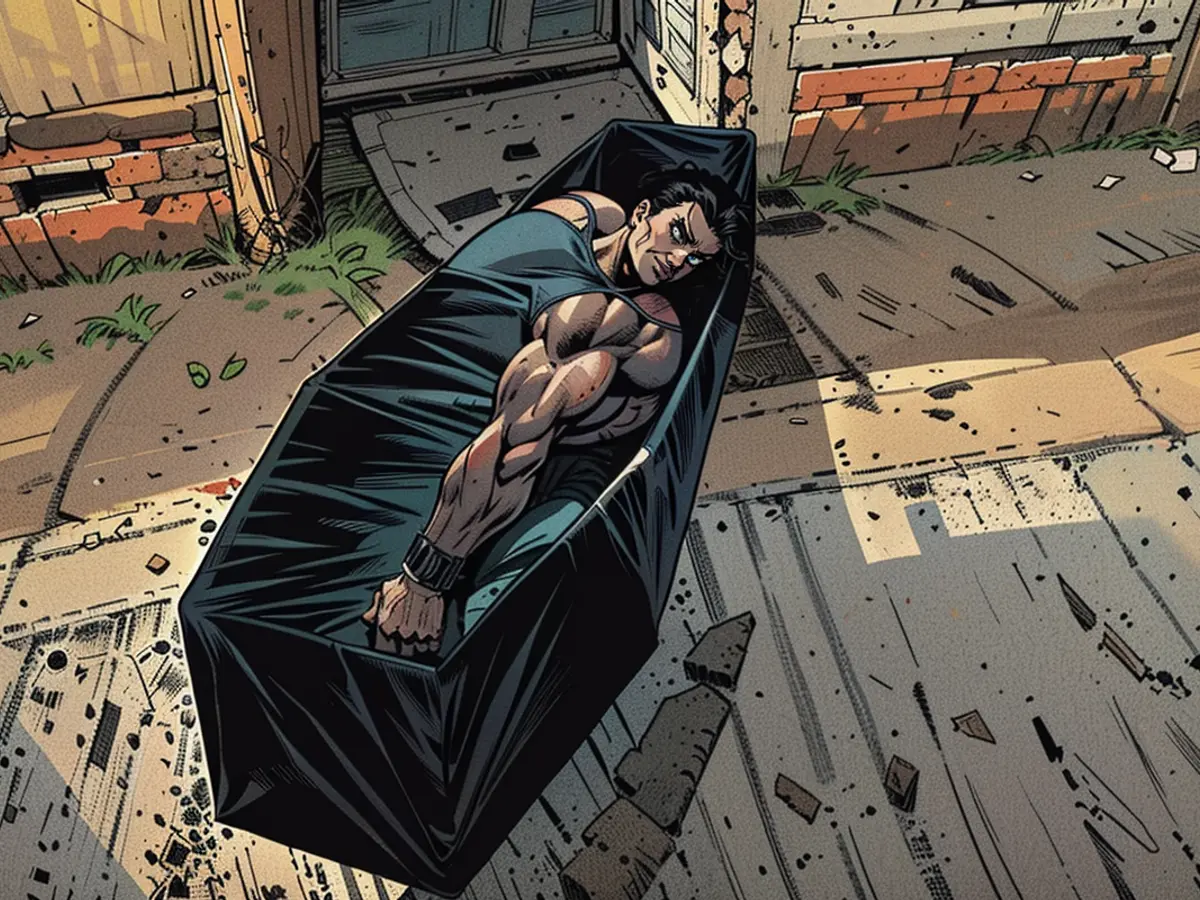Criminal clan places casket at activist's residence doorstep, as reported by Roman law enforcement.
The anti-mafia crusader, Tiziana Ronzio, serves as the head of the Toripiubella organization, named after the Tor Bella Monaca district in Rome, where the primary strongholds of the Casamonica family once stood before their demolition in 2018 and 2019 by the city authorities.
During the demolition, law enforcement officers uncovered opulent decorations, such as life-sized porcelain tigers concealing cash, expensive diamond-encrusted pools adorned with golden horses and mirrored ceilings plated in gold, and numerous tons of illicit substances - heroin and cocaine - being stored. In 2022, two of the family members were found guilty of attempting to smuggle seven tons of cocaine from Colombia.
The cadaver was discovered on a Sunday outside Ronzio's residence in Tor Bella Monaca.
Ronzio revealed on Sunday afternoon that she had seen the corpse and had received photographs of it from others, but it wasn't until her security detail informed her that she realized it intended as a threat.
Ronzio labeled the threat as "moronic" and declared that it wouldn't deter her from continuing her work, but she also acknowledged that it had "disrupted" her organization, which regularly reports members of the group for committing crimes against local residents and frequently serves as a witness on their behalf in court.
"I'm not scared, I'm moving forward," Ronzio expressed to local media. "These are foolish acts that serve to anger us even more and motivate us to fight back."
Meanwhile, Rome police confirmed on Monday that the corpse was being analyzed for fingerprints. Toripiubella, Ronzio's group, chose not to comment on the matter publicly as the investigation was still ongoing.
Ronzio has denounced numerous clan members in the past.
"There have been numerous instances where one simply chooses to ignore certain transgressions," she told Italy's Sky24 news on Sunday evening, recalling previous instances of intimidation, which included written threats and feces left at her doorstep by her neighbors.
"I try to approach such situations with equanimity but it's not always easy; I treat it as if it were someone else's problem, and yet I keep moving forward," she said, adding, "It's challenging to live near the individuals you've reported to the police."
Ronzio's residence and office have been burglarized numerous times, but she told La Repubblica newspaper, "It's rarely that one finds a coffin buried beneath their house."
"It could quite possibly occur that an uncivilized individual might leave behind a piece of furniture, a sofa, but not a coffin," she explained, in an article published on Monday.
Several political groups have criticized the act of intimidation.
In an article published on Sunday, Rome's mayor Roberto Gualtieri expressed his support for Ronzio, stating, "Solidarity and support for Tiziana Ronzio in the face of the horrible threat she received today. The commendable work she has been performing for years alongside numerous other honest citizens in Tor Bella Monaca will certainly not give in to intimidation. The city and its administration will continue to stand by Tiziana's side in her daily mission to uphold legality and justice in the community."
Tobia Zevi, Rome's councilor for heritage and housing policies, also expressed his support for Ronzio, saying, "The denunciation against organized crime (and) the courage and perseverance that have characterized her work in challenging times will not be diminished by the fear of yet another offensive act against her."
Scenes from ‘The Godfather’
The Casamonica clan was first identified as a mafia-style organization by Italy's Anti-mafia Investigation Directorate, or DIA, in the 1970s. The main families originated as nomadic Romani groups that arrived in the capital from rural Italian provinces after the end of World War II and are estimated to be worth around 90 million euro ($101 million), according to the DIA. They are most often associated with extortion, racketeering, and usury, but they have also been involved in threats similar to the one against Ronzio and have been implicated in numerous murder cases. There are approximately 1,000 members associated with the group. A dozen people connected to the group are currently facing trial for stealing electricity from a housing project in Rome.
The group gained notoriety in 2015 when they were, somehow mysteriously, given permission by Rome authorities to hold an extravagant funeral for the family patriarch, Vittorio Casamonica, which included a horse-drawn carriage for the coffin and a helicopter that dropped rose petals over the Tor Bella Monaca neighborhood.
Given that the Casamonica clan are recognized by Italian authorities as a criminal enterprise, it is uncommon that they were granted authorization to hold a public funeral, as other mafia groups have been prohibited from doing so for their bosses.
Despite police protection and a brass band outside the church that played music from 'The Godfather' trilogy, that procession took place.
In 2019, during a trial against 40 Casamonica family members who were accused of mafia association, drug trafficking, extortion, usury, and illegal possession of weapons, an informant testified that a matriarch had attempted to poison him.
The informant, Massimiliano Fazzari, spoke in court about the use of acid, which he claimed was kept in a vat in one of the family's villa basements in Rome.
"They threatened to dissolve me in acid," Fazzari said of Liliana Casamonica, the matriarch of one of the families.
The Casamonica clan, identified as a mafia-style organization, has been linked to extortion, racketeering, and usury, not just in Rome, but also across Europe. Tiziana Ronzio's group, Toripiubella, regularly reports members of the Casamonica family to local authorities for committing crimes against local residents.








